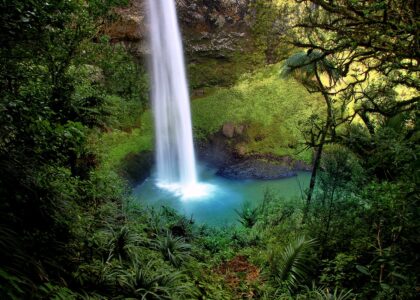Let’s delve into the captivating world of Sri Lanka and explore why it deserves a prominent spot on your travel bucket list. From golden beaches and misty mountains to magnificent elephants and tantalizing cuisine, Sri Lanka is a treasure trove of diverse experiences. This enchanting island nation offers everything from sun-soaked beach getaways to thrilling wildlife encounters, heart-pounding adventure sports, and spiritual journeys to ancient cities. With its warm smiles, spicy dishes, exotic fruits, and unique sweetmeats, Sri Lanka is a melting pot of cultures, making it a delightful destination for relaxation and adventure.
We’ll cover all you need to know about traveling to Sri Lanka, including information on weather, cultural customs, safety, food and drinks, accommodation options, activities, and costs.
Weather
Sri Lanka experiences two distinct monsoon seasons, each impacting different regions of the country at different times of the year. This unique weather pattern ensures that there’s always a sunny destination to explore on the island. The southwest monsoon, occurring from May to July, keeps the north dry, while the northeast monsoon, from October to January, opens up the south for exploration. For culture enthusiasts, the period from December to April, during the dry season, is perfect for exploring historic ruins, ornate temples, colonial churches, and natural wonders.
Culture and Customs
Sri Lanka places great value on cultural traditions and practices, with Theravada Buddhism exerting a significant influence on the culture, especially in the southern and central regions. One intriguing cultural aspect to note is that Sri Lankans traditionally eat with their right hand’s fingertips, rather than using cutlery. However, most establishments are accommodating and provide cutlery to visitors who prefer it. It’s also customary to use your right hand when offering a handshake or giving money. It’s essential to respect Buddhist monks, and children should not touch or pat the top of a monk’s head. Avoid standing next to or turning your back on a Buddha statue, and never wear clothing with images of Buddha or other deities as it is considered impolite. Public displays of affection are seen as private, and public nudity is prohibited. It’s important to note that same-sex relationships are illegal in Sri Lanka.
Safety and Security
Generally, Sri Lanka is a safe travel destination, although petty crime rates are relatively high. Exercise caution, especially in crowded areas. With due diligence, your trip to this enchanting island is likely to be smooth and hassle-free.
Food and Drink
Sri Lankan cuisine is a culinary delight, reflecting the influence of Indian, Malay, Dutch, Portuguese, English, and indigenous flavours due to centuries of trade and colonization. Some must-try dishes and drinks include:
- Fish Ambul Thiyal (sour fish curry): A popular fish curry made with a blend of spices, including black pepper, cinnamon, turmeric, garlic, pandan leaves, and curry leaves, along with dried goraka to impart the sour flavor.
- Kottu (or kottu roti): Sri Lanka’s national fast food, prepared using flatbread known as godamba roti, often served with a spicy curry sauce.
- King Coconut Juice: A refreshing drink found on Sri Lankan beaches, prepared from the king coconut palm, known for its sweet and revitalizing taste.
- Elephant House Ginger Beer: A quintessential Sri Lankan soft drink made from local Ayurvedic ginger, known for aiding digestion and combating fatigue.
Accommodations
Sri Lanka offers a wide range of lodging options to suit various budgets. Guesthouses, often family-run, are popular among budget travelers, providing a homely atmosphere and delicious meals. Hotels come in various styles and sizes, from simple concrete structures to opulent colonial mansions. Some of the most charming hotels can be found in historic colonial buildings, offering a glimpse into the past. The coastal areas boast numerous resort hotels, catering mainly to package tourists with buffet dining and organized activities.
Activities and Attractions
Sri Lanka is replete with captivating attractions and activities, catering to diverse interests. Some must-visit sites and experiences include:
- Nine Arch Bridge: A mesmerizing stone bridge in Ella, offering stunning views of lush landscapes and the passing trains on the Demodara Loop.
- Mihintale: A sacred mountain near Anuradhapura, significant for its role in introducing Buddhism to Sri Lanka.
- Unawatuna: A picturesque beach destination known for its white sands, perfect for relaxation and water activities.
- Kataragama Festival: An annual Hindu festival featuring vibrant costumes, elephant parades, traditional dances, music, and more.
- Wildlife Safaris: Get up close to elephants and other wildlife in national parks like Udawalawe.
- Exploring Uninhabited Islands: Discover remote islands off the northern coast, such as Neduntivu (Delft), where you can witness ancient baobab trees and coral forts.
Costs
The cost of a 7-day vacation in Sri Lanka varies, with an average cost of £1,627 for a single traveler, £2,899 for a couple, and £1,473 for a family of four. Accommodation ranges from £32 to £207 per night, with budget vacation homes costing between £40 and £400 per night. International flight prices depend on the class, with economy class ranging from £600 to £1700. Plan to spend about £28 to £56 per person per day on transportation and dining.
Sri Lanka is a captivating destination that promises an array of diverse experiences, from pristine beaches to rich cultural traditions, delicious cuisine, and breathtaking natural beauty. Whether you seek adventure, relaxation, or spiritual enrichment, this island nation has it all. Have you visited Sri Lanka before? Share your experiences in the comments, and if you haven’t, consider adding this enchanting destination to your travel plans.




